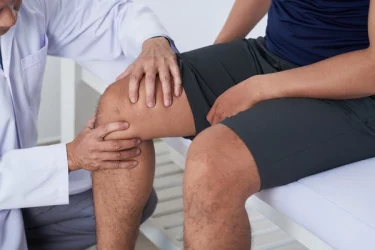If you need a knee replacement, it’s likely you’ll have a lot of questions. Like, how much does a knee replacement cost, how should I prepare for surgery, and what’s the best time of year to have knee replacement surgery?
Join us as we explore whether there’s an optimal time of year to take the plunge!

When is the best time to have a knee replacement?
Before you start investigating whether specific times of year are favourable for surgery, you may want to learn more about general waiting times for knee replacement. According to the NHS Waiting List Tracker, since 2018 there has been no recognisable trend to suggest a specific time of year is more popular than others for knee replacement surgery. But is it that straightforward? Are certain seasons of the year better for making a full recovery?
Benefits and risks of Spring knee replacements
Benefits
The daffodils are out and everyone’s enjoying their Easter eggs, so is Spring the best time of year for knee replacement surgery? The short answer is: yes. As the weather is getting warmer, you’re less likely to contend with the icy conditions of winter. Summer temperatures are still a few months off, so sleeping comfortably at night shouldn’t be a problem.
Risks
Unfortunately, great minds think alike, and it’s likely other knee replacement patients will have had the same idea. If you’re seeking treatment through the NHS, this can drive up waiting times meaning you’ll be recovering at a time of year you didn’t initially expect.
Benefits and risks of Summer knee replacements
Benefits
The Sun is shining, temperatures are rising and everyone’s smiling. This makes one of the main benefits of a summer knee replacement recovery a question of wellbeing. With lighter nights, you’re much more likely to find the motivation to complete your physiotherapy recovery plan.
Risks
While centering your knee replacement recovery at the height of summer may seem like a good idea, a closer look may make you think twice. This is because during the summer, you’ll more likely have high temperatures to contend with which could make keeping cool an issue. This could prove disruptive to sleep, which is crucial in making a full and swift recovery. While recovering, it’s also likely you’ll need to rely on family and friends to help you with household chores. However, if they’re all sunning themselves on holiday in Spain, this may prove difficult!
Benefits and risks of Autumn knee replacements
Benefits
Like Spring, Autumn is a good time of year to undergo knee replacement surgery. The temperatures make sleeping far easier, while the nights are lighter, making exercise more accessible.
Risks
While Winter is still a few months away, Autumn in the UK can be wet and cold. This leads to slippery outdoor conditions which are dangerous for people recovering from knee replacement surgery.
Benefits and risks of Winter knee replacements
Benefits
Dark nights and freezing temperatures don’t make for ideal conditions when it comes to recovering from knee surgery. However, negatives of the season aside, one positive is that fewer people are likely to seek surgery at this time of year. This could mean shorter waiting times for you.
Risks
Knee replacement surgery in the Winter means any recovery exercises outdoors could be undertaken in snowy or icy conditions. This can be particularly dangerous as the risk of falling over is greater. Damage to your new artificial joint can delay recovery and lead to further surgeries. Dark nights and cold temperatures could also prove detrimental to your motivation to carry out and complete your physiotherapy recovery plan.
Other factors to consider when scheduling a knee replacement
Before you start planning your surgery, you may want to step back and find out about a few things. Such as, how much a knee replacement costs, and the do’s and don’ts after knee replacement. If you know that surgery is needed, it’s time to investigate a little further. We’ve looked at the part played by weather conditions and seasons when planning knee replacement surgery, now it’s time to consider other factors.
Your level of pain
When planning your knee replacement surgery, you may want to consider the amount of pain you’re experiencing. Ideally, you need to get yourself referred for surgery as soon as your doctor recommends it. If you’re seeking treatment on the NHS, you need to take potentially long waiting times into account. During this wait, it’s likely your knee pain will increase which, in turn, may disrupt your ability to carry out daily activities.
The current waiting time for private knee surgery at Practice Plus Group is between two and four weeks depending on location.
Quality of life
This runs a similar path to the amount of pain you’re experiencing. You will need to consider how much pain you’re currently in with your knee, and whether this is stopping you from carrying out daily activities. The inability to perform activities you normally enjoy can lead to decreased quality of life and poor mental wellbeing.
Your age
Another factor to consider is your age. On the whole, younger people are likely to be more active than older ones. With this in mind, if you’re a younger patient who enjoys an active lifestyle, you may want to consider getting surgery as soon as you can. For younger patients, seasonal factors such as weather are less likely to play a big part when choosing the time of year to have surgery.
Your work schedule
Factoring in your work schedule depends on the type of work you do. If your work is seasonal (i.e. it gets busier during the summer months) you may want to think about planning your surgery once the busy periods are over.
If you work behind a desk, you may be able to return after a couple of weeks. However, a return to manual labour will typically take longer. If you’re a teacher, it’s likely you’ll need to schedule your surgery for the summer holidays.
Recovery time
Recovery depends on the type of knee surgery you’ve had and how old you are. A total knee replacement takes around six weeks to recover from, depending on how closely you follow your physiotherapy plan. You should factor this in when planning your knee replacement surgery.
When your caregivers are available
Another factor to consider is caregivers. In the days and weeks following your surgery, you will need to rely on friends and family to help you carry out general household chores such as shopping. If those friends and family are enjoying a summer holiday during your recovery, it’s unlikely they’ll be able to help you.
Hospital waiting times
The current NHS waiting time for orthopaedic surgery in England is around 16 weeks. At Practice Plus Group, the current waiting time for private knee surgery is between two and four weeks depending on location.
Does the weather affect knee replacements?
New knee joints aren’t generally affected by a drop in temperature, but some patients do experience an increase in stiffness and sensitivity.
Icy conditions can affect new knee joints as the danger of slipping and falling is much higher while trying to move around. High temperatures in the summer can also make sleeping difficult. Rest and sleep is crucial to making a full recovery, and disrupted or insufficient sleep could delay your rehabilitation.
Does cold weather affect a total knee replacement?
According to a National Library of Medicine report from 20201, there is a link between colder weather and patients experiencing pain in their orthopaedic replacements. However, there was no link found between this pain and sex, occupational status or the type of implant. In fact, one of the findings indicated that cold air from air conditioning units played a significant role in causing pain for patients with orthopaedic implants.
The dangers of delaying knee replacement surgery
Put simply, if you wait too long for surgery, you put yourself at risk of developing long term complications. Waiting too long for surgery can put you at risk of the following issues:
- putting strain on other parts of the body to compensate
- potential for reduced mobility in your new knee joint post-operation
- increased pain and lower quality of life.
Scheduling your knee surgery
The first step on your self-pay journey is to book an appointment. You won’t necessarily need a referral, which means you may not need to make a GP appointment beforehand. Once your referral is dealt with, our friendly staff will book you in at the hospital of your choice.
Once your appointment is booked, it’s time for your initial consultation. This includes a nurse’s assessment and an x-ray (if required). The consultant will then talk you through the treatment options and indicate whether further tests are required.
Once you have undertaken any diagnostic tests required and treatment has been agreed with the consultant, we’ll get you booked in for total knee replacement surgery at a time and date that’s convenient for you.
References:
1National Library of Medicine: Effects of cold weather on patients with orthopaedic implants





